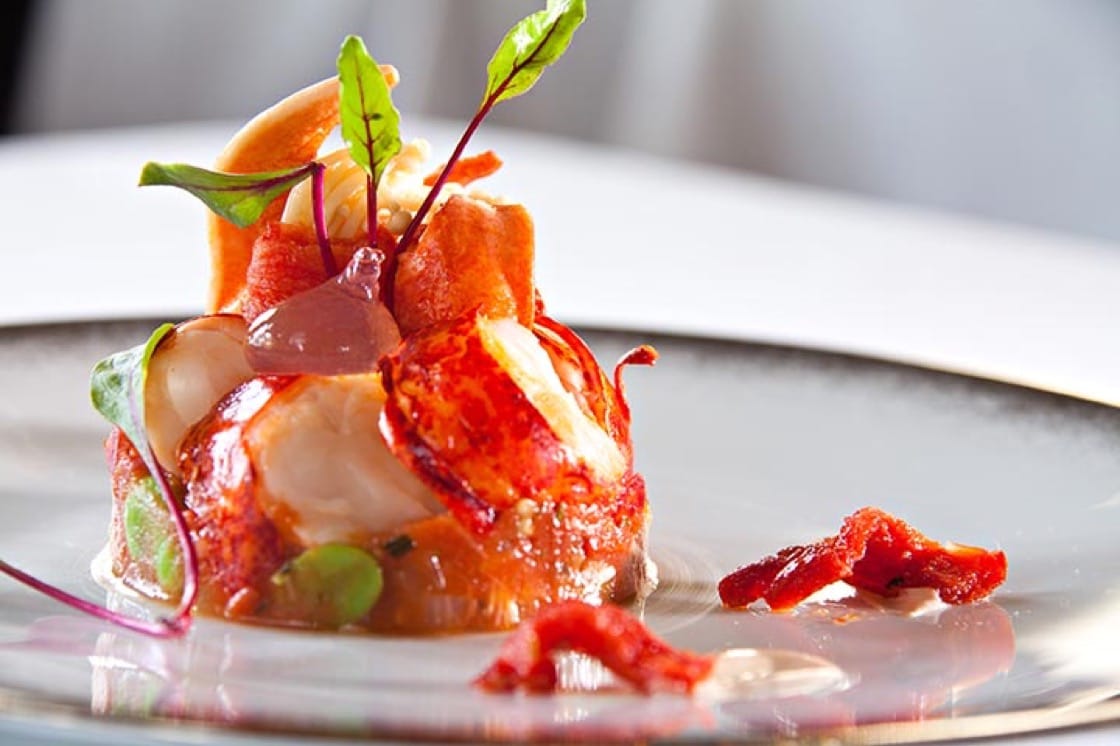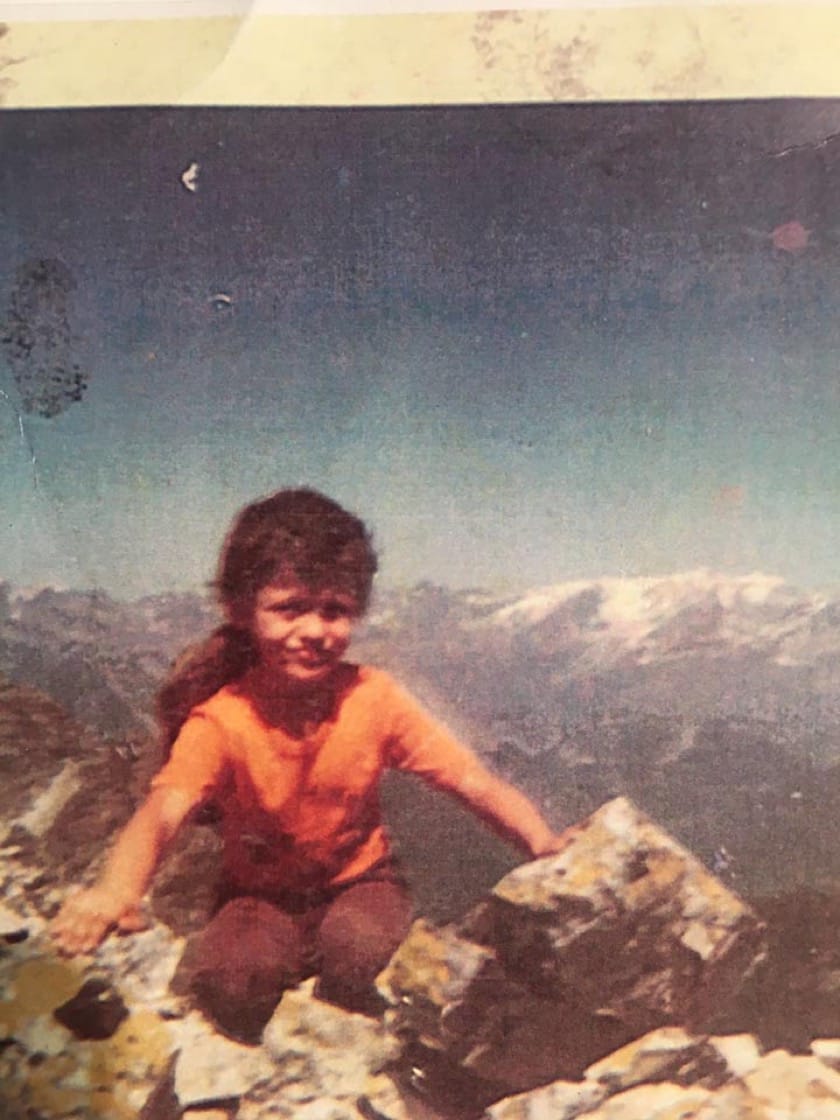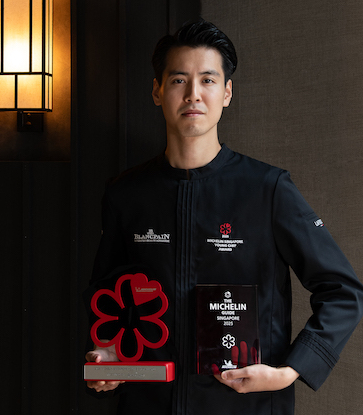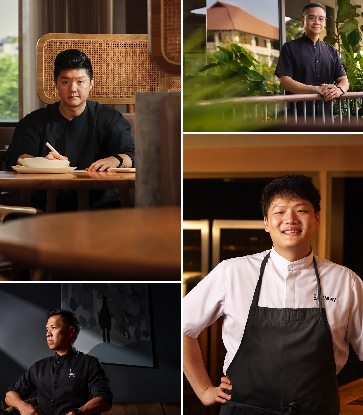A self-taught chef from Bourg-Saint-Maurice in France, Guy Martin is one of the most accomplished chefs and restaurateurs in Paris today. The 59 year old is chef-owner of Le Grand Véfour, the oldest restaurant in Paris and a revered beacon of French gastronomy. Known for his modern and sensuous cuisine with an emphasis on quality produce sourced from his native Savoie and various regions in France, chef Martin joined Le Grand Véfour in 1991 after a 10-year stint cooking in prestigious Relais and Chateaux institutions Château de Coudrée and Château de Divonne.
In town for the second run of Resort World Sentosa's Art at Curate dining series, chef Martin sits down with the Michelin Guide Singapore for an exclusive interview to talk about his cooking philosophy, growing up in the French Alps, and his passions outside of the kitchen.
1. What is it like working in the oldest and most famous restaurant in France?
Le Grand Véfour is the first restaurant for gastronomy in all of France, it opened after the revolution in the centre of Paris, near the Louvre Museum, in a beautiful area. I never think I am working when I’m in the restaurant, I feel like I’m in a painting and I am so happy. Everything around me in the restaurant is yellow and gold, just like in the paintings, and its all authentic. French painter Fragonard dined here, along with Alexandre Dumas, Victor Hugo; it was where Napoleon Bonaparte proposed to his wife Josephine.
Every day now, you have someone very known in the world - a pop star, a king, someone “wow” - dining here. But for me, every guest who comes in is a VIP, whether they are a king or a driver of the train, I treat them the same.

2. What is your cooking philosophy?
My approach to cuisine has always been very 'zen' - it’s about achieving pleasure and health.
You have to feel well in your head and body at the same time to love life, and I achieve this by using the best ingredients. All my ingredients I use are organic, and I work a lot with vegetables. To know all my products, I often go to the mountain and the sea to visit the people who produce the ingredients for me. I have a naturopath and a nutritionist that I have worked with for a long time, and I get them to look through my menus. But this is not to say we neglect taste and presentation; the first thing you see on the plate is also very important.
For me, rich flavours and healthy food are not in opposition. You can have a lot of pleasure even from food that is good for you. I try to put not too much cream or butter in my dishes, but butter is good for the heart, you know? It’s vitamin A - you need it.


I grew up among the mountains in the Savoie region of France, we lived 20 minutes from Mont Blanc in the French Alps. In the mountains, you ate whatever you could find in your area. After you went fishing, you ate the fish; if you picked mushrooms and herbs, that’s what you ate.
I grew up wanting to be an alpinist - a mountain guide or ski instructor - not a cook. I attended a school for mountaineers. I became a cook eventually, but I never forgot the mountain. Up in the mountains, you realise are nothing in the world; the mountain is very large and you are very small. Even when I travel in the world today and visit nice places and different restaurants, I never forget where I came from.
4. So at what point did you discover your passion for cooking? And did you ever dream that you would be where you are today?
When I was 18, I read a lot of books on food and I said, why not I become a chef, and so I did. I started at the very bottom. When I started to cook it was for the money, I never aimed for this. I always thought of the present, that I may perhaps die tomorrow, so I never projected so far in life. I try to travel light, and because of this, I am happy every day. I appreciate each day and every second, because tomorrow, I may go. For me, in life, I love to do what I want to do; if I don’t want to do it, I won’t.
Today, I have three passions in life: my job, the mountain, and horses. Yes, horses. I do dressage, or training and taking care of horses. In fact, I was just helping a friend with his two younger horses before flying to Singapore. It helps me in the kitchen because it teaches you to be calm, and to be in control.
5. Last year, you opened the restaurant Les Mutinés at the luxurious The Brando resort in French Polynesia and this year, you will open Le Barth on the resort island of St Barth’s, while working on an upcoming project in Beijing. It sounds like a lot of work! What keeps you motivated?
Because I believe that one should treasure the present moment, I try never to do something that I don’t feel right or proud about. I seek every day to find the best product and the best ingredient - I never you say ‘Ah, it’s just okay’. It’s either right or it’s not right. If it’s not right, I prefer to stop. I want to only create things that are beautiful - not for the money.
If you look at the websites of my restaurants, they are all in beautiful destinations. If I wanted to, I could open a lot of restaurants, but at the end of the day, I want the places that I have to go to to be nice. Each restaurant is very different but the philosophy is the same: to serve the best products in a nice place.

6. When you were just 26, the restaurant you were heading earned its first Michelin star just six months after your arrival. Later, at Le Grand Véfour, you helped the restaurant to maintain its 3 Michelin star-rating for 8 years and have also been decorated as an Officer of the Ordre de La Légion d'Honneur (National Order of the Legion of Honor) by the French Government.
Just last week, your I Love Paris restaurant in Paris' Charles de Gaulle Airport was named as the best airport restaurant in the world in an international competition. That’s plenty of achievements for someone with a ‘zen’ outlook in life! How much do awards and titles matter to you?
Before I got my first star, no one knew me, but the day I got it, it was very exciting. This was in 1985, but I still remember it like it was today. We had a fiesta. Paul Bocuse called, people sent flowers, we drank good wine, a magnum of Ruinart and some Moet and Chandon Imperial, and ate with friends. We took two days off. It was a great moment.
It’s really a plus to be in the Michelin Guide, but you should never forget your clients and what you want to do in life. You have to be true to yourself, what you do has to feel ‘right’, not just for the stars and the awards.

7. Any advice for younger chefs in Singapore?
I always ask younger chefs: what do you want to do in life? Some chefs want to work for the President, some want to open a little auberge in the mountains, others want to go to Tokyo, Singapore or New York to work. You have to have a dream and then work for this dream, and make it possible. If you want to walk on the moon, you can. But you have to dream it first - it is really important to dream.
8. And the best advice ever given to you?
It was the philosophy of the mountains, and that is to look. The mountain people are simple - reality is right in front of you when you grow up on the mountain. When you ascend a mountain, you go up slowly over five to six hours and in that time, you can observe every detail around you - you can look at the sun, feel the wind, see if the rain is coming, watch the pebbles tumble down. Every detail is very important and I appreciate each second because i know perhaps one day it will end.
Often people say, I will be happy tomorrow, but why leave it to tomorrow? If you want to do something, do it now, and take pleasure in your life, because life is very short. Every second that is lost today, you won’t be able to get back tomorrow.
Chef Guy Martin was specially invited to Singapore for Art at Curate, organised in partnership with Michelin Guide Singapore and Robert Parker Wine Advocate. Diners can meet him and experience his cuisine exclusively at Curate restaurant in Resorts World Sentosa from 8 to 15 July, or in the restaurant's collaborative menus that will be served until 10 September.
Curate is Asia’s first restaurant dedicated to providing a perennial stage exclusively for visiting Michelin chefs from around the world to showcase their finest culinary creations, further complemented by an extraordinary wine cellar that houses a prized collection of 365 highly rated labels.
















